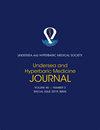Aerobic exercise performance is reduced following prolonged cold-water immersion
IF 0.7
4区 医学
Q4 MARINE & FRESHWATER BIOLOGY
引用次数: 0
Abstract
We tested the hypotheses that self-paced aerobic exercise performance is reduced following four hours of cold-water immersion when breathing air and further reduced when breathing 100% oxygen (O2). Nine healthy adults (four women; age 24 ± 3 years; body fat 17.9 ± 6.4 %; V̇O2max 48 ± 9 mL·kg·minute-1) completed three visits: a no-immersion control trial and two experimental trials consisting of a four-hour cold-water immersion (20.1±0.3C) either breathing air (FIO2 = 0.21) or O2 (FIO2 = 1.0). During the no-immersion control trial and following immersion in the experimental trials, subjects first completed a 60-minute ruck-march carrying 20% of body mass in a rucksack, immediately followed by an unweighted, self-paced 5-km time trial on a motorized treadmill. Core temperature, heart rate, and rating of perceived exertion were recorded every 1,000 meters during the 5-km time trial. Data are presented mean ± SD. Time trial performance was reduced following immersion in both the 100% O2 trial (32 ± 6 minutes; p=0.01) and air trial (32 ± 5 minutes; p=0.01) compared to the control trial (28 ± 4 minutes). However, there was no difference between the 100% O2 and air trials (p=0.86). Heart rate, core temperature, and rating of perceived exertion increased during the time trial (time effect: p<0.01), but were not different between trials (trial effect: p≥0.33). These findings suggests that prolonged cold-water immersion attenuates self-paced aerobic exercise performance, but does not appear to be further affected by breathing gas type.长时间的冷水浸泡会降低有氧运动的表现
我们测试了一种假设,即在呼吸空气的情况下,在冷水中浸泡4小时后,自定节奏的有氧运动表现会下降,在呼吸100%氧气(O2)时,这种情况会进一步下降。9名健康成年人(4名女性;年龄24±3岁;体脂17.9±6.4%;V / O2max 48±9 mL·kg·min -1)完成三次访问:无浸泡对照试验和两项实验试验,包括4小时冷水浸泡(20.1±0.3℃),呼吸空气(FIO2 = 0.21)或氧气(FIO2 = 1.0)。在无浸泡对照试验和浸泡后的实验试验中,受试者首先在背包中负重20%的体重完成60分钟的徒步旅行,紧接着在电动跑步机上进行无重量、自定节奏的5公里计时赛。在5公里计时赛中,每1000米记录一次核心温度、心率和感知运动等级。数据以均数±标准差表示。浸泡在100% O2试验中(32±6分钟;P =0.01)和空气试验(32±5分钟);P =0.01),与对照试验(28±4分钟)比较。然而,100% O2和空气试验之间没有差异(p=0.86)。计时赛期间心率、核心温度和感觉运动等级升高(时间效应:p<0.01),但试验间差异无统计学意义(试验效应:p≥0.33)。这些发现表明,长时间的冷水浸泡会降低自定节奏有氧运动的表现,但似乎不会受到呼吸气体类型的进一步影响。
本文章由计算机程序翻译,如有差异,请以英文原文为准。
求助全文
约1分钟内获得全文
求助全文
来源期刊

Undersea and Hyperbaric Medicine
医学-海洋与淡水生物学
CiteScore
1.60
自引率
11.10%
发文量
37
审稿时长
>12 weeks
期刊介绍:
Undersea and Hyperbaric Medicine Journal accepts manuscripts for publication that are related to the areas of diving
research and physiology, hyperbaric medicine and oxygen therapy, submarine medicine, naval medicine and clinical research
related to the above topics. To be considered for UHM scientific papers must deal with significant and new research in an
area related to biological, physical and clinical phenomena related to the above environments.
 求助内容:
求助内容: 应助结果提醒方式:
应助结果提醒方式:


